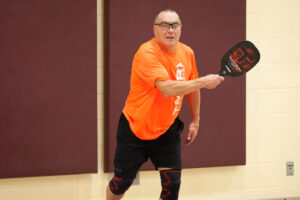This started out as an answer to a simple question from someone who was wondering what to realistically expect in a doubles partner. As I thought about it, it occurred to me that I was also describing what my partner might be expecting from me. And then it was obvious that my answer would really apply to all players, laying out the framework for what a good partner should be in pretty much all situations.
So if you would like to become a highly desirable partner, get to work on the following three things.
Routine Shots
First and most important – you need to make the routine shots. This is a trust thing. Your partner wants to be able to trust you to make the routine shots.
You should be able to take advantage of easy overhead slams without driving the ball into the net. If you routinely drive those shots int the net, find out why and fix it.
If you are in a dinking rally, you should be able to easily dink a minimum of 25 shots. As you get better, you will learn to be more aggressive and take control of dinking rallies, but you don’t want to hit routine dinking shots into the net. Never. So work on it. Drill it. Not until you get it right, but until you can’t get it wrong.
And work on your drop and reset shots so that these become routine. Again, practice is the key here so that you are a dependable partner, making all the routine shots.
Shot Selection
Secondly, you need to practice reasonably intelligent shot selections.
Hitting hard drives from below the net at the NVZ line is generally a bad idea. Show some insight and make good dinks or resets as appropriate.
Banging the ball from mid-court or your baseline is rarely a good idea. Don’t do it.
As you get better at point one above (making the routine shots) you will see the value in better shot selection. Nobody really enjoys playing with a banger who routinely hits drives into the net or off the court.
Know where your opponents are, what their strengths and weaknesses are, how hard they hit, and anything else that will help you make a good shot selection. And remember, even if a drop shot is not always the right shot, it will never be the wrong shot.
Strategies
And thirdly, you need to demonstrate some understanding of good strategies and be able to execute them.
You will generally serve deep, return deep, and routinely get to the NVZ promptly. You also realize when you don’t do one of the above you pay a price, and you can quickly correct it.
You understand the difference in play between offense (serving) and defense (receiving). Specifically, you are not as likely to take a high risk shot while on defense, or especially in the middle of a 10-9 rally.
You are generally able to execute a third shop drop that allows both partners to get to the NVZ, to avoid being ambushed on your side of the court. And you understand the critical importance of the fourth shot in keeping your opponents at their own baseline.
And (bonus points for this one) you are able to raise your level of focus and intensity when you need to stop your opponents’ momentum, or you need to close out a tight 10-9 game.
Demonstrate good strategies, and bring success to the game.
The Up Side
In summary, you should work at mastering these skills. You should also look for these skills in prospective partners.
Work on these three things, and you will definitely become a better player, you will win more games, and people might even ask you to play with them.
Now go do it.
Michael Gauthier
Owner/Instructor, Pickleball Strokes
Owner/Photographer, Freedom Photography
You’re just one stroke away!
Michael Gauthier

I love pickleball, and Pickleball Strokes is my on-line home. I live in Ottawa, ON and have been playing pickleball since 2012. I am an avid instructor, referee, and 4.5 player.
I am a Certified Pickleball Teaching Professional, as designated by the International Pickleball Teaching Professional Association.
I play with a TMPR Tantrum GXT paddle and I am proud to be a sponsored member of the TMPR Sports Pro team.